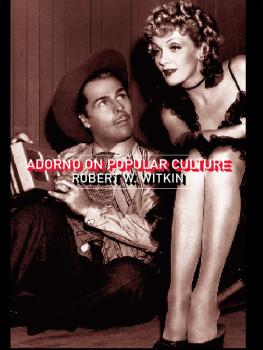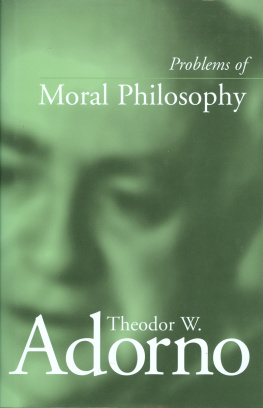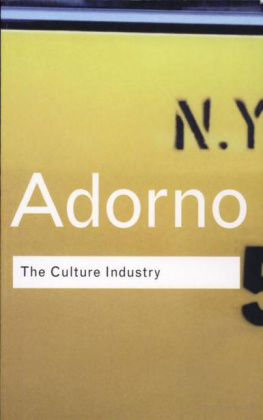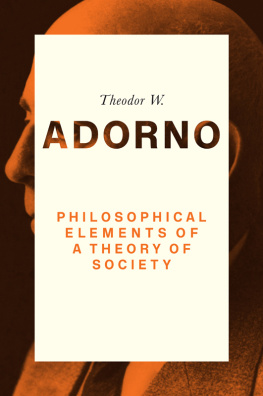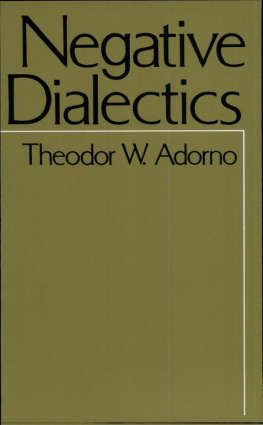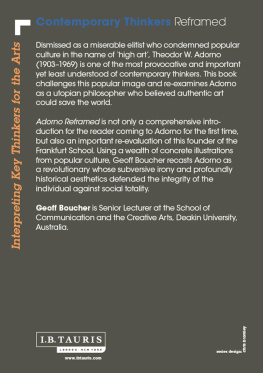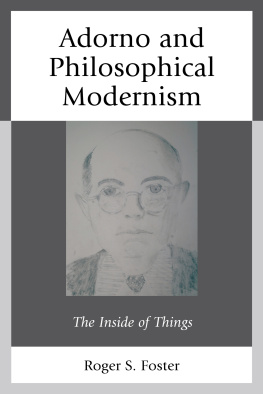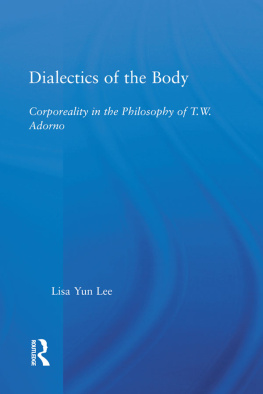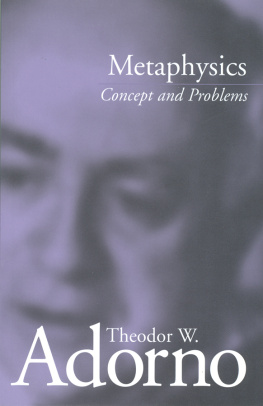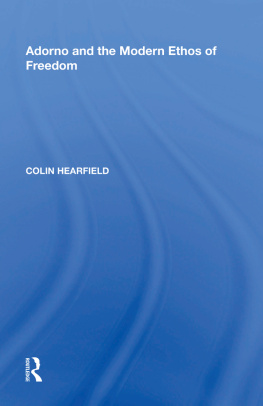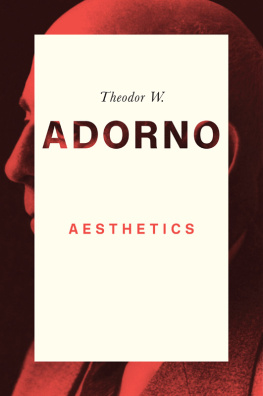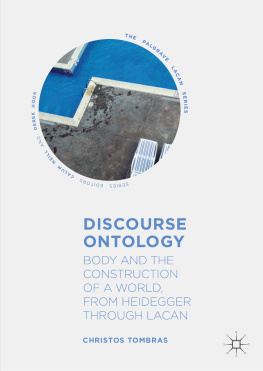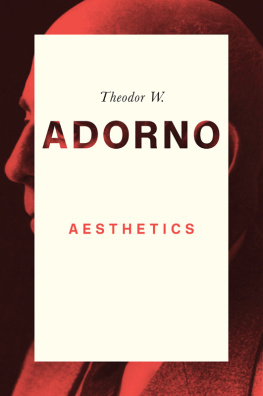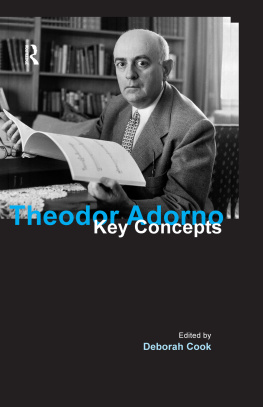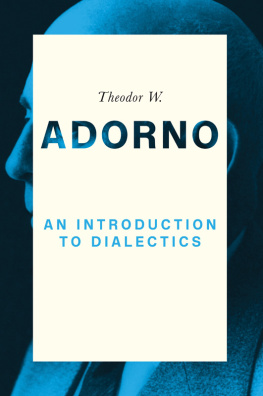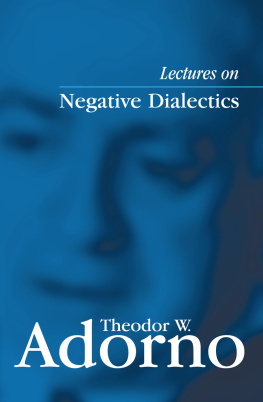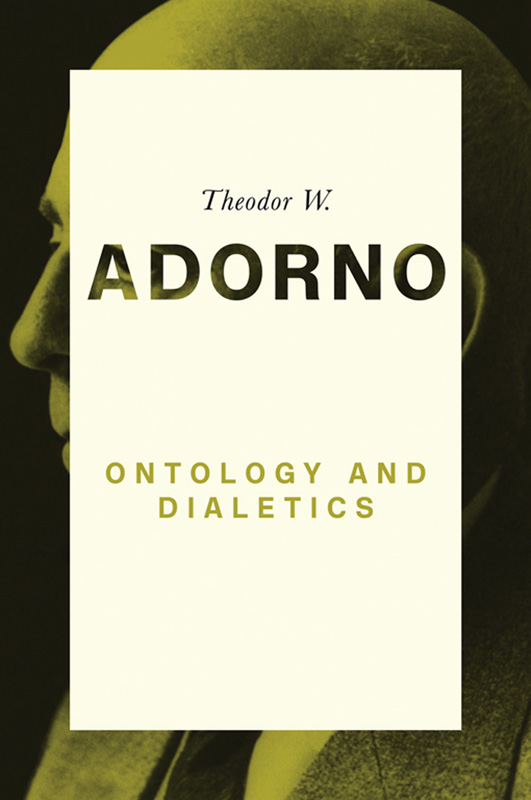Table of Contents
Guide
Pages
Ontology and Dialectics
1960/61
Theodor W. Adorno
Edited by Rolf Tiedemann
Translated by Nicholas Walker
polity
First published in German as Ontologie und Dialektik(1960/61), Suhrkamp Verlag, Frankfurt am Main, 2002
This English edition Polity Press, 2019
The translation of this work was funded by Geisteswissenschaften International Translation Funding for Work in the Humanities and Social Sciences from Germany, a joint initiative of the Fritz Thyssen Foundation, the German Federal Foreign Office, the collecting society VG WORT and the Brsenverein des Deutschen Buchhandels (German Publishers & Booksellers Association)
Polity Press
65 Bridge Street
Cambridge CB2 1UR, UK
Polity Press
101 Station Landing
Suite 300
Medford, MA 02155, USA
All rights reserved. Except for the quotation of short passages for the purpose of criticism and review, no part of this publication may be reproduced, stored in a retrieval system or transmitted, in any form or by any means, electronic, mechanical, photocopying, recording or otherwise, without the prior permission of the publisher.
ISBN-13: 978-0-7456-9312-5
ISBN-13: 978-0-7456-7946-4 (pb)
A catalogue record for this book is available from the British Library.
Library of Congress Cataloging-in-Publication Data
Names: Adorno, Theodor W., 1903-1969, author.
Title: Ontology and dialectics : 1960/61 / Theodor W. Adorno.
Other titles: Ontologie und Dialektik, 1960-61. English
Description: English edition. | Cambridge, UK ; Medford, MA, USA : Polity Press, [2018] | Originally published: Ontologie und Dialektik, 1960-61. Frankfurt am Main : Suhrkamp, 2002. | Includes bibliographical references and index.
Identifiers: LCCN 2018010019 (print) | LCCN 2018021553 (ebook) | ISBN 9780745694900 (Epub) | ISBN 9780745693125 | ISBN 9780745679464 (pb)
Subjects: LCSH: Ontology. | Dialectic.
Classification: LCC BD313 (ebook) | LCC BD313 .A3613 2018 (print) | DDC 111dc23
LC record available at https://lccn.loc.gov/2018010019
Typeset in 10.5 on 12 pt Sabon Roman
by Toppan Best-set Premedia Limited
Printed and bound in Great Britain by CPI Group (UK) Ltd, Croydon
The publisher has used its best endeavours to ensure that the URLs for external websites referred to in this book are correct and active at the time of going to press. However, the publisher has no responsibility for the websites and can make no guarantee that a site will remain live or that the content is or will remain appropriate.
Every effort has been made to trace all copyright holders, but if any have been inadvertently overlooked the publisher will be pleased to include any necessary credits in any subsequent reprint or edition.
For further information on Polity, visit our website:
politybooks.com
Editor's Foreword
Adorno had once considered employing the title Is Metaphysics Possible after Auschwitz? for the section of Negative Dialectics which undoubtedly formed the heart of the work and was eventually entitled Meditations on Metaphysics (NaS IV.13, p. 462). And this initial formulation, which alluded to the central question posed by Kant in the Introduction to the Critique of Pure Reason, could well be applied to the book as a whole: the idea of a negative dialectic searches after some kind of answer to the question of whether philosophy can be pursued at all after all that has happened in the meantime. Whereas the traditional notion of a critique of reason could once ask how truth in an emphatic sense is possible Kant himself had spoken of synthetic a priori judgements without having to put this very possibility into question, for the philosopher who had returned to Germany after the era of fascism, and after everything that a German mass industry of destruction had unleashed upon the world, it was anything but self-evident that one could simply carry on the business of philosophy as if nothing essential had changed. In the Dialectic of Enlightenment, written in the 1940s under the immediate impact of the events in Germany, Adorno and Horkheimer admitted that what we had set out to do was nothing less than to explain why humanity, instead of entering a truly human state, is sinking into a new kind of barbarism (GS 3, p. 11; Dialectic of Enlightenment, trans. Edmund Jephcott, Stanford University Press, 2002, p. xiv). This question, in relation to which the traditional problems of philosophy had come to appear irrelevant, would never cease to haunt Adorno and constituted the centre of his thinking to a degree that was paralleled only in the case of Gnther Anders. Towards the end of Negative Dialectics Adorno asks whether after Auschwitz one can go on living; rather than a simply rhetorical question, this was actually the gravest question of all, and Adorno specifically asked in relation to his own life whether one who escaped by accident, one who by rights should have been killed, may go on living. For his mere survival calls for the coldness, the basic principle of bourgeois subjectivity, without which there could have been no Auschwitz (GS 6, pp. 355f.; Negative Dialectics, trans. E. B. Ashton, Routledge, 1973, p. 363). After he returned from exile to Germany, Adorno composed numerous essays and investigations which addressed a whole range of different themes and subjects, yet they were all basically concerned with deciphering what he called the basic principle of bourgeois subjectivity; and in the seven years between 1959 and 1966 he was principally engaged with the composition of Negative Dialectics, which represents a kind of summation of all his specific material studies. Here Adorno undertakes to traverse the frozen wastes of abstraction (GS 6, p. 9; Negative Dialectics, Ashton, p. xix) to see what has become of the traditional philosophical categories under the conditions of society after Auschwitz. With reference to specific models, Adorno provides a substantive indication of how moral philosophy and the philosophy of history have to be transformed if they are to remain possible for us at all. Thus Negative Dialectics had no ultimate pronouncement or definitive solution to offer beyond the exposed and vulnerable doctrine that something resembling philosophy could only be salvaged if it can make itself good in materialist terms. Just after the book was published Adorno wrote to Gershom Scholem in the following terms:
What I describe in an immanent epistemological context as the priority of the object, and what can actually only be conceived in an extremely delicate way rather than simply as a crude assertion or only in a dialectical way is precisely what does justice to the concept of materialism, so it seems to me, once we have escaped the spell of identity. The convincing arguments which I believe I have brought against idealism thus appear, beyond this spell, and indeed stringently I think, as materialist in character. But this implies that such a materialism is not simply fixed or conclusive, is not some kind of world-view. It is this path towards materialism, quite remote from all dogmatism, which seems to harbour that affinity to metaphysics, or I might almost have said to theology, which you have rightly recognized as the central motif here. (Letter to Scholem dated 14 March 1967)
It is this concept of materialism, the centre around which Adorno's Negative Dialectics turns, that prevents philosophy from stopping its ears against the cries of the victims, a concept which attempts, on the contrary, to think with such ears. For this approach the need to lend voice to suffering is a condition of all truth (GS 6, p. 29;


